- Home
- Joy Dettman
Henry’s Daughter Page 16
Henry’s Daughter Read online
Page 16
She’s using that F word again. She’s putting it in front of banks. She’s shredding cheques with Mavis L Smyth-Owen printed on them and she’s using the F word in front of Mavis L Smyth-Owen and she’s using it in front of state-run homes, then in front of the F word and then there is a long stream of F words, and she doesn’t care, because there is more noise coming from the street.
Someone must have called the cops because they come with their wailing sirens; Lori can see the reflection of their blue lights on the rain. By the sound of it, half the neighbours are out the front. Half of Willama, even. Lori stays where she is. She’s shaking and she’s stopped saying the F word, she’s singing ‘Oh, My Papa’ to the beat of the rain on the roof. She’s teeth-chattering, freezing cold but she keeps on singing loud, hitting her head against the brick wall and singing ‘Oh, My Papa’. And she knows all the words and she didn’t know she knew all the words.
And she’s crying, or hot rain is running out of her eyes and pouring down her face, but she keeps singing that song, over and over again, singing and pumping out hot rain until everything goes quiet. Stays quiet. Even the rain. Even her tears.
They must have got Mavis. They must have stuck chains around her and dragged her up onto a tow truck.
But they haven’t got her because Lori hears her coming. She hears the puffing and blowing and it’s coming closer. And if she truly had a bad heart, then it would have stopped for sure by now, wouldn’t it? She was swinging that axe like she could have cut up a ton of wood and Lori expects that axe to start cutting through the old green door.
Mavis is pushing at it. She’s gasping words, hasn’t got enough wind left to roar. She’s thumping against the door and Lori is watching it strain in against the slide bolt.
Good old green door. Be strong, old ancient door.
Silently Lori winds the window open. The gap is small because of the chain, but she’ll get through, or maybe she’ll just break the window and go through the frame. She pulls the old chest of drawers nearer, climbs up on it. Waits. Maybe the door hinges will hold. She waits.
Her lungs wheezing for air, Mavis gives up and flip-flaps off through the mud to the outside loo. Minutes later she huffs and puffs back. Lori hears the thunk of the couch digging a deeper hole through the wall into the big boys’ bedroom where nobody sleeps, and she hears Mavis yelling into her phone.
No taxi driver comes knocking at the door.
The chest of drawers is wobbly and Lori’s head and stomach are wobbly too, but she listens. Mavis is still yelling at someone on the phone, but no taxi beeps out front. Maybe Martin has fixed up the taxi people.
No sound of kids in that kitchen. They must still be at Nelly’s. Lori is shivering, teeth-chattering cold, but she’s not opening that door to find out what’s happened to the little kids. She’s got Mavis’s bank stuff and her battery charger, and she knows that mobile phone doesn’t hold a charge for long. It will run out of power, sooner or later it will run out of power.
She looks at the charger, then slides from her perch to the floor. Holding on to it by the electrical cord, she dips it in the loo water, like she’s fishing; she dips it deep, almost loses it around the S bend. For an hour she sits there fishing, drowning the charger, killing it while in the kitchen the phone calls go on, and on, and the cement floor keeps getting colder. She sits on the loo seat, props her feet against the chest of drawers and hangs on to the charger.
They’re back. Martin and Mavis are going at it again. And Jamesy is there too. She listens. And Alan, she can hear his cough. No little ones, though. It’s way past their bedtime and Nelly hasn’t got enough beds to put them in. Lori knows what has happened to them, knows that they’ve been taken away. She’s letting tears drip again on the concrete. She’s bone-aching cold but her tears are hot. Big, fat, scalding, splatty tears.
The doctor and some strangers’ voices are out there. Maybe the lady cop. It’s late, like it might even be midnight, but those people get things quiet.
‘Lori,’ Jamesy calls out back.
‘Splint! Where are you?’ Martin tries the door. ‘Splinter. Answer me.’
Lori is on the other side of that good old green door. She’s still got the charger and the bank stuff she’s been holding in her hand for hours. She tucks them down the front of her sweater, pokes them under her bra, and they look like misshapen boobs, but she slides the bolt, folds her arms across her square boobs.
Martin takes her, holds her while she cries out the last of being one of the little kids. She cries for Henry and for the home he used to make. She cries and she shakes and Martin is warm and he keeps holding her, letting her cry. Alan puts his arms around her too, and he coughs and cries with her.
It’s later when she finds out why he’s crying, and it’s for a different reason. Eva is back in St Kilda. The police lady has been in touch with her about Greg, and Martin has bought Alan a bus ticket home.
‘It’s what Henry wanted,’ Martin says. ‘Alan is sick, Splint. He’s not as strong as you and Jamesy and he needs a decent place to live. I’ve just done what Henry would have wanted me to do,’ Martin says while Mavis sleeps.
The doctor came with three helpers and he hit Mavis with an elephant dart, Jamesy says. ‘Knocked her out in seconds. Pow.’ Jamesy is grinning, not crying. He mimes the injection, mimes the extended-arm, stiff-legged walk to her bedroom, the collapse. Lori watches him as she sniffs her final sobs away.
‘The little kids are in emergency care,’ Martin says. Lori looks at him as if he’s a kid thief. She looks at Alan, the traitor. ‘It’s better for them,’ Martin says. ‘They are together, they’ll keep them together until – ’
Until it all gets broken up for good, and they’ll grow up strangers, and who cares? She’ll have brothers everywhere and she won’t know them, like she doesn’t know Alan’s twin, who he’s going back to. They’ll all end up like Henry, who didn’t know any of his blood family.
Getting adopted must run in families. Being taken away from your mother must run in families. Being deserted by your father must run in families. It’s interesting – almost. She never thought it would happen to her. A year ago she thought she’d grow up in Willama, leave school and get a job at the supermarket or McDonald’s, but the clock has nearly run down.
Too tired to fight any more. She leaves Martin and the other boys in the kitchen and goes to bed in the clothes she’s wearing. The battery charger digs in. The chequebook wallet is sharp. She puts them under her pillow and shivers herself warm.
Alan’s Gone
Alan leaves at eight the next morning, his antibiotics in his hand. It’s not easy waving him goodbye, but it is what Henry wanted, and better for Alan to go back to a rich home and his twin than to die of Willama germs. Lori walks him to the depot, waves to him as the bus drives away. He came, and now he’s gone. She knew him, and now she won’t know him any more. She stands there and bawls. Just bawls her eyes out. Can’t stop doing it, either. She’s been doing it half the night.
The doctor keeps coming back, keeps injecting Mavis, due to she won’t take pills. Martin has moved back home because Karen still won’t talk to him and Mavis has been tamed by that doctor and, also, he’s got no other place to go.
Willama is pretty big for a country town but it’s not big enough for secrets. Everyone knows about that street war and the little kids being taken away, and if they haven’t heard about that, then they know a taxi driver or one of the people in the takeaway shops, or even the cleaning lady. Everyone knows someone, so just going to school is pure gruesome embarrassing. All the kids look at Lori, whisper behind their hands. Lori gives them a look at her middle finger.
Martin has taken three weeks holiday from bricklaying, which is not much of a holiday, but since that crying night when Karen dumped him, he’s tough, like his word is law. Mavis signs the withdrawal forms, she lets the doctor give her injections, lets the nurse shower her. Her blood pressure has gone through the roof, the doctor tells Martin. He
r system has taken too much abuse, she has to diet or she won’t live long enough for the baby to be born.
It’s like Henry killed himself, so she’s now killing herself. It’s like she hates her kids and wants to get away from them. That’s probably why Henry did it – hated looking after all of those kids and when he found out there was going to be another one, he got away the only way he could.
It’s in the second week that Mavis starts spending a lot of time sitting on the verandah. She’s probably watching for the postman, hoping the bank might send her another chequebook. Lori watches for him too, because if that chequebook comes, she’s going to get it first and rip it up, flush it too.
Anyway, after a bit, because of Mavis now taking her pills and Martin being home and the house back to clean, the little kids get brought home from emergency care. They are all over their colds and they’ve got nice clean clothes and shoes on, and they don’t look the same – they look better. The social worker man brings them and while he’s lifting those eyebrows and having a good look around, Martin takes the opportunity to get Mavis to sign a withdrawal form.
For a while it’s almost back to normal, like vegetables and sausages and frozen fish and supermarket chips, but Mavis isn’t normal, and Martin isn’t Henry. Though he’s cooking and cleaning all day, he’s spending his nights phoning Karen’s parents or just sitting, playing with his mobile and waiting for Karen to forgive him and call. And he’s hating Mavis more every day.
Then about a week after his holiday is over, Karen forgives him, and he starts driving out to the farm after the kids are in bed and coming home in time to make breakfast, or not coming home at night to cook dinner. Matty is bawling again because Mavis tossed his dummy out. And she’s not taking her pills. She’s hardly taken any of her pills. Lori knows exactly how many have gone from those packets.
She climbs on a chair, looks on top of the kitchen cupboard for money. Henry sometimes put coins up high. No coins, but she pinches a packet of Valium then goes over to Nelly, borrows two dollars and buys Matty a new dummy from Kmart, which she threads on string then pins to his sweater.
‘Stay away from Mavis, or she’ll take this one too. Run over to Nelly’s if she tries to get you.’ The packet of Valium still in her pocket, her fingers play over the little bubble-covered pills. Mavis is in the loo, so Lori pops one small yellow pill free and crushes it between two spoons, like Mavis and Donny did the night they zapped Alan. It’s easy. It turns into powder. She tastes a bit on her finger. It’s sort of tasteless. A bit sweetish. A bit bitter.
One day before the clock runs down again and they take her away to put in a home, she’ll hammer all the pills to powder and mix them with condensed milk and she’ll stick a funnel in Mavis’s mouth while she’s asleep and she’ll pour in the lot. Mavis will just think she’s having a lovely sweet dream. She’ll swallow it, and then Martin will come home for good and Donny will come back, and Mick, and they’ll all live happily. Lori washes the powder down the sink, washes the spoons, watching the water circle as it finds its way down the plughole. She’s never noticed how that water circles before.
She washes the dishes, wipes the bench, the table, like Martin wipes it. She takes a bag full of rubbish out to the green bin, looks at Henry’s potting shed and wonders if his flowers are all dead. She hasn’t given them any water since Alan left, and too bad. She has to sweep the floor so Martin won’t have to do it when he gets home and his eyes won’t get that trapped, hopeless expression.
She never swept the floor for Henry. She never washed dishes, never washed anything. When Henry was alive, she was like a baby caterpillar, woven into a soft cocoon so it didn’t have to see anything, and even if she did see it, she didn’t have to understand. Like Henry’s eyes that last day. His eyes were already dead and she didn’t even know it.
She walks into the bathroom, turns on the two taps, stands watching the hot and cold streams join, making that same circle. How come they make a circle? Henry would know. Alan might know. But they’re gone. She shrugs, glances up at the shaving mirror where her face is sort of hiding behind the foggy cocoon. Quick as a flash, she wipes away the fog, wanting to see into her eyes before they start looking at themselves.
And for a second she does. It’s, like, dark in there, like it’s a horror show on a stormy night playing behind her eyes. She wipes the mirror again, and stares into those dark eyes. The storm is gone and they just look big and dark and sad.
No more baby caterpillar. She’s been ripped out of her soft cocoon too early, so she didn’t have time to grow wings. She’s turned into a wingless moth with two big eyes that can see the whole world is waiting out there to stomp on her because she has to crawl along the gutter instead of flying in the sky.
The Last Straw
Martin hasn’t been home since last night and there’s no bread, no milk, no nothing, plus Mavis has been out of cigarettes all day due to Martin forgot to get them. Maybe he forgot on purpose. She’s stomping mad and the kids are staying out of her way. They are watching her, though, when she starts washing her green tent in the sink, when she gets the iron and starts steaming up the kitchen trying to iron that tent dry.
It didn’t come clean and it’s not big enough any more. She’s massive, like twice as massive as she was when Henry was alive. She gets it on, then goes to her bedroom, gets a giant’s jacket from her wardrobe and tries to put her arm in, and when it won’t go in, she screams and pitches the jacket, tries to kick it, and lucky the bed is there. It saves her from falling.
It’s strange, really, the way Lori’s eyes are seeing things so clearly today. They’re seeing that red hair hanging around those humpy, bumpy shoulders. They’re seeing that awful sagging mouth she’s painting with lipstick – seeing the hands that paint it. They look fat, not beautiful. Seeing those bare fat feet. Mavis always had okay feet and ankles. Today they won’t go into those old flattened scuffs.
It’s raining, not much, just a steady drizzle, and she’s got no jacket, she’s got no shoes, but she sways out to the verandah, stands there a while, then she’s walking out to the road.
Lori watches from the lounge-room window, sees Mavis stop, wipe rain from her eyes as she looks forward, looks back, looks at Nelly’s house. She won’t go to Nelly’s house to beg, so back wins, though she has to heave herself, like each footstep through the mud is pushing a mountain uphill. She can’t make the step up to the verandah, and she has to hold on to a verandah post to make that step; the spouting over that verandah post is all rusty so there’s a waterfall and it’s wetting her, soaking her.
‘Bastard,’ she says, and the post shudders, but she gets one foot up, then the other, gets herself back to the kitchen and flops down onto her couch, sits there, dripping water and gasping for air.
‘Get down . . . to the bank. Get . . . forms. Withdrawal forms. Chequebook forms. That bastard . . . that bastard better not . . . come near me. He better . . . stay away . . . from me. They’d all . . . better . . . stay away from me.’ She’d be better off saving her air to pump blood, because she’s looking blue.
Lori doesn’t say a word, but she tosses her a dry towel; she’s feeling guilty-sad, like, she’s the one who flushed the cheques down the loo, and that battery charger she chucked into a green bin at school. Didn’t chuck the other bank stuff. She hid it where Greg used to hide his stolen cigarettes. Maybe she should give it back.
Martin has been looking for it. Lori didn’t tell him she hid it, which is thieving. Henry hated thieves.
The kids wait until five, then Nelly comes over with her big black umbrella.
‘His ute has blown a head gasket,’ she says. ‘Come on. Get your coats.’
She’s been plotting with Martin again and Lori knows it by the way Nelly isn’t meeting her eyes, but they eat her good dinner gladly, eat thick soup and toast, then bread and butter pudding and ice-cream. They are still eating it when the phone rings.
‘It’s got to be better for them,’ Nelly says soft
in the next room. ‘This is doing none of them no good at all, Smithy.’
And Lori is up, her pudding forgotten. She snatches the phone. ‘You’re not splitting us up, Martin.’
‘I can’t do anything else, Splint. And you know I can’t. She’s gone around the twist. There’s nothing anyone can do with her – not long term.’
Gone around the twist might be one of his expressions but long term isn’t. And it doesn’t sound like his voice either; it sounds tired, sounds as if maybe his head gasket isn’t even blown, he’s just sick of looking after kids.
Then Lori hears Karen’s voice coaching him in the background. She’s given him an u-l-t-i-m-a-t-u-m. That’s what’s happened. Like, you do as I say, Martin, get rid of them or the engagement is off again. She’s probably listening in to the phone call too.
‘You tell that stuck-up bitch from me that she can fuck off while I’m talking to you, Martin, and tell her from me that she can keep her nose out of our family’s business.’ She hangs up before he can say anything and she goes to Nelly’s front window and stares at that falling-down house over the road.
Mavis is on the verandah looking around for someone. She’s probably starving. It’s like a family who got themselves a new pup for Christmas and didn’t know it was going to grow into a giant man-eating killer dog, and now that it has, they don’t even bother to feed it, which just makes the man-eater even more determined to eat everyone.
Lori watches her walk to the road again, where she stops, looks back but moves forward. It’s the cruellest, saddest walk Lori has ever seen. She bites hard on her hand trying to stop her eyes from dripping those big scalding tears as Mavis plods barefoot through the mud, sort of stopping and starting, but heaving herself forward, one plodding step at a time.
‘Smithy. Come and finish your pudding before the plagues of Egypt eat it.’

 The Hope Flower
The Hope Flower Trails in the Dust
Trails in the Dust Diamonds in the Mud and Other Stories
Diamonds in the Mud and Other Stories Moth to the Flame
Moth to the Flame The Tying of Threads
The Tying of Threads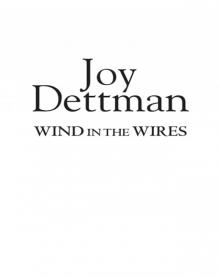 Wind in the Wires
Wind in the Wires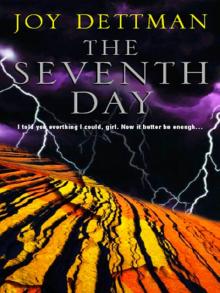 The Seventh Day
The Seventh Day Thorn on the Rose
Thorn on the Rose Jacaranda Blue
Jacaranda Blue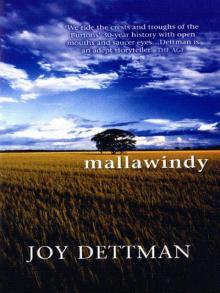 Mallawindy
Mallawindy Ripples on a Pond
Ripples on a Pond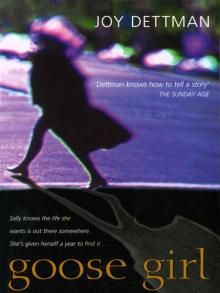 Goose Girl
Goose Girl The Silent Inheritance
The Silent Inheritance Henry’s Daughter
Henry’s Daughter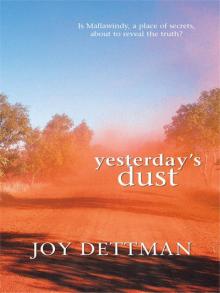 Yesterday's Dust
Yesterday's Dust Pearl in a Cage
Pearl in a Cage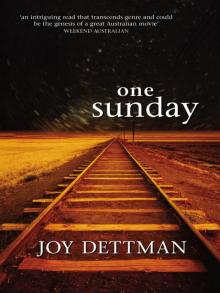 One Sunday
One Sunday